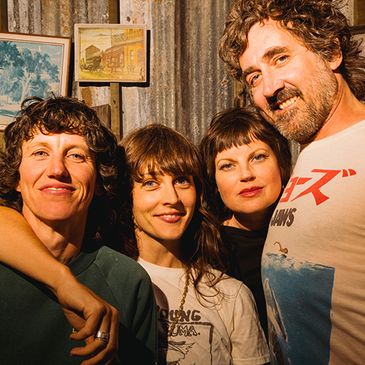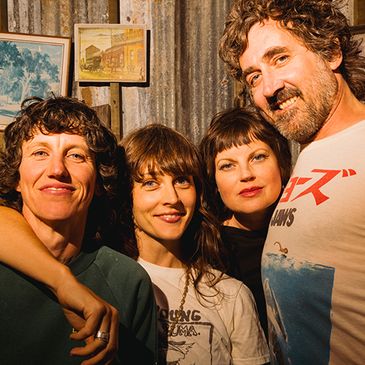
Tropical Fuck Storm
The Chapel
∙
San Francisco
Sunday, July 6 at 8 pm PDT
Concert Venue
Sunday, July 6 at 8 pm PDT
Concert Venue
Entry Options
Details
Description
To request ADA seating: Please send us an email at boxoffice@thechapelsf.com or call our box office at (415) 551-5157 and we can assist you. Our ADA area can reach capacity early, so we highly recommend contacting us as soon as possible. Day of show requests may not be able to be accommodated.
bandcamp | Spotify | YouTube | Instagram
Australian post-apocalyptic acid punk disco scuzzheads Tropical Fuck Storm are bringing their wild, destructive, and unstoppable live show to a stage near you this Summer! Thrill to the interwoven shredding of guitarists Gareth Liddiard and Erica Dunn, feel the bone-rattling basslines of Fiona Kitschin, and marvel at the mind-boggling drumming of Lauren Hammel. Move over Barnum and Bailey, because there’s a new Greatest Show on Earth and it’s coming to YOUR TOWN!"A Tropical Fuck Storm gig is like putting your brain in a blender for an hour straight" Beat Magazine"In Tropical Fuck Storm’s determination to engage as fully as possible with the reality of human existence, in all its ugliness and contradictions, they are tapping into its truths." The Quietus“Tropical Fuck Storm are masters of tension and release.” - The Guardian“Tropical Fuck Storm Stir Up A Psychedelic, Dadaist Spectacle” - Bandcamp Daily“A messy, hyperverbal, supremely danceable monolith.” - Aquarium Drunkard
Bill Orcutt: Charlie Parker's first album with a string section landed in 1950, ten years after his debut recordings. Although the overtly lush arrangements of Charlie Parker with Strings were Parker's idea, the record must've been something of a relief to producer Norman Granz, especially when the sides went on to become Bird's best-seller, by a long shot. The record (and its follow-up) sparked something of a jazz-strings virus, infecting Nina Simone, Paul Desmond, Clifford Brown, and (later) Miles and Trane. And while the latter entries in that list were clearly bending their arrangements into space-age forms (and the arrangers — Gil Evans, Eric Dolphy — were becoming much hipper), these ubiquitous strings albums established a jazz cliché of sorts. They were a shot for the charts at worst, an attempted reinvigoration of tired easy-listening ear candy at best.
How to Rescue Things, landing 15 years into Bill Orcutt's “rediscovery” years, marks a somewhat tardy entry into the string-sweetening sweepstakes. In a post-chart, post-irony world, no one is going to mistake this as a bid for mainstream ears — nor are too many pop-gobblers going to paste this into their “Chillax” playlist. With loops of dulcet, birdsong choruses, syrupy strings, and plucked harps clipped from an RCA easy-listening disc, the zombie strings conjure not red leather couches, cotton slankets, and yuzu martinis, but rather a clockwork mortuary, an undead Who-ville and a cigarette butt drowned in bottom-shelf scotch. In contrast to Orcutt's previous reanimation of yesterday's hit parade, How to Rescue Things instead takes as its foundation the oily underbelly of the American songbook, the relentless gears that churn melody into newly consumable and marketable forms — simultaneously ersatz, soothing, and funereal.
It's easy to use saccharine, easy-listening settings to deconstruct the romanticism of the past. Yet How to Rescue Things is not an ironic record. True to its title, the transparently corny strings serve not as a meditation on cultural vacuity, but as an attempt to rehabilitate the clichés of the past, “rescuing” them as improvisational grist for new melodic content. They serve as a harmonic substrate for some of Orcutt's most complex playing, and free him to explore the solo-as-such without the need to imply an underlying tune (unlike Orcutt's previous acoustic explorations of nostalgic song).
Orcutt's razor-sharp Fender slices through the satiny settings in angular and unexpected ways, particularly in the final tracks “Requiem in Dust” and “The Wild Psalms,” where his double picking swerves into almost Sharrock-ian territory. But ultimately, true to the Parker records that started this whole trope in the first place, Orcutt sticks to a complex yet tonal path throughout, imbuing tracks like “Not Reconciled” (with its crooned “Oh my god” and a cheeky “amen” tacked to the end) with wide-eyed romantic optimism that goes down strange in a deathbed ballad. But ultimately, it's not strange at all. Rather, this palliative track celebrates a necessary, death-defying joy in the face of darkness — whether genuine or performative is unimportant. And what's more genuinely American than whistling past the graveyard? Just ask Judy Garland. — TOM CARTER

